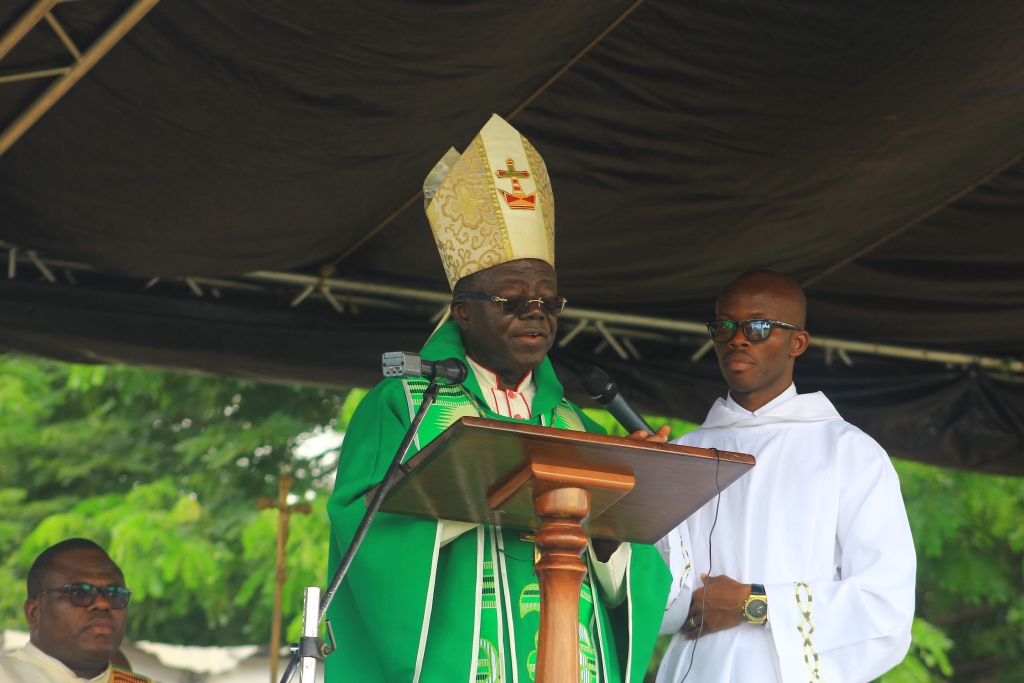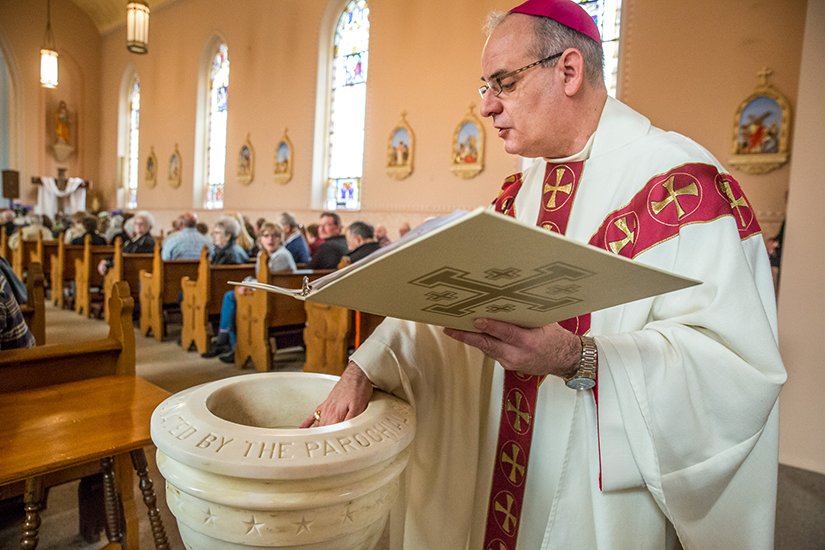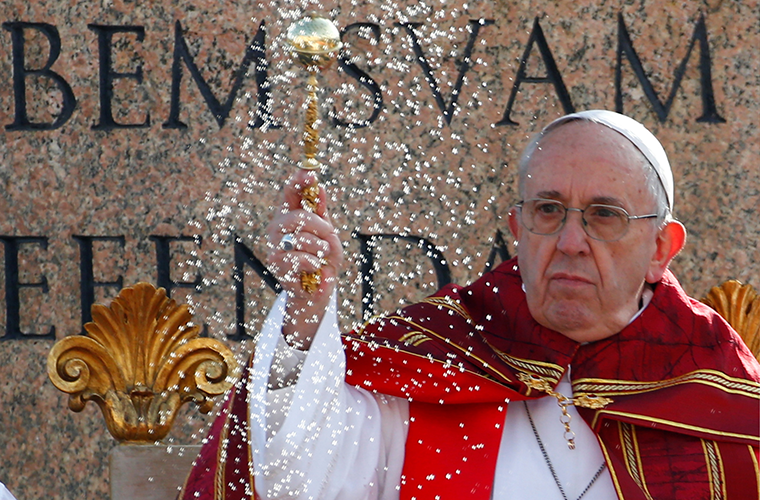Holy Water its place in the Catholic Church, Bishop Osei Bonsu answers a question asked by Christian Dugan
My Lord, there is this argument about the potency of holy water, and it goes like this: according to some people, when one keeps adding ordinary water to a container of blessed water, as in holy water, its potency will reduce. So if you have a 500 ml container of holy water and you keep using some of the water and keep topping up the container, the potency or holiness of the water will be reduced till it will no longer be holy or potent. Please, how true is this? Since if a few drops of holy water can bless or make holy a larger object or many people, why should its potency reduce when you keep topping up a small container of holy water?
Answer:
Let us begin by looking at what holy water is and what it is used for. In the Catholic tradition, holy water is water that has been blessed by a priest or bishop. It is a symbol of the sacrament of baptism. It is used in a number of ways including the following:
- Holy water during the Celebration of Mass:- Periodically, on Sundays, we have the blessing and sprinkling of water as a reminder of baptism. In one of the prayers said during the Rite of Sprinkling of Water on Sundays during the Paschal Season, the priest prays, “May this water remind us of our baptism and let us share in the joy of all who have been baptized at Easter”. The Sundays of the Easter Season and Pentecost are the most appropriate time for this rite. It serves as a link with the renewal of baptismal vows and sprinkling with water that takes place during the Easter Vigil. It is particularly fitting for the worshipping community, a priestly people by virtue of their baptism, to start the celebration of Mass on Sunday with this sprinkling, especially as each Sunday is a particular celebration of the Easter mystery.
- Holy Water in the Baptistery Font and in the Stoup:- Catholic churches typically keep some of the blessed or holy water in a baptistery font and in a stoup or a smaller font found near the entrance of the church. It is common practice for Roman Catholics to dip their fingers in the stoup and bless themselves with the holy water as they enter or leave the church. This serves as a reminder of baptism. Whenever we dip our fingers in the water basins at our churches, we should not just do so out of blind devotion. Let us be mindful of our sins and sincerely repent. Holy water is a wonderful reminder of Jesus’ power to cleanse us of our sins and make us pure again. In one of the prayers used to bless water during Mass on Sundays, we pray God to “forgive our sins”.
- Blessing of religious Items:- Many Catholics own statues, prayer booklets and rosaries and use these in their daily lives. We can bring these items to the church so that the priest can bless them. This is a meaningful way of honouring the things we use in our spiritual lives.

- Blessing a new House:- Buying a new house or moving to a new home is an event worth celebrating and many Catholics mark this occasion by hosting a house blessing. This is a good way for the priest to bring positivity and peace into the new living quarters. At the same time, this gives the homeowners the opportunity to give thanks to the Lord for the gift of a new house.
- Blessing the Workplace:- We can have our workplace blessed for the same reason that we have our homes blessed. We want to give it spiritual protection so that it becomes a place of peace. Our office is a place where we can bring glory to God through our work so it is understandable that we want it to be blessed as well.
- Driving away Evil:- St. Teresa of Avila said, “From long experience, I have learned that there is nothing like holy water to put devils to flight and prevent them from coming back again”. Holy water has long been considered a weapon against evil spirits and demons. Priests who are exorcists use it during exorcism rites; it is also used to drive away evil from people and from homes. In one of the prayers used to bless water during Mass on Sundays, we pray God to “give us your protection on this day which you have made your own. Renew the living spring of your life within us and protect us in spirit and body, that we may be free from sin and come into your presence to receive your gift of salvation”. In another prayer used to bless water during Mass on Sundays, we pray: “Lord God…as we use it in faith, forgive our sins and save us from all illness and the power of evil. Lord, in your mercy, …free us, body and soul, from every danger, and admit us to your presence in the purity of heart”.
- Cure for ailing Body Parts:- Particularly the holy water from Lourdes is well known to have miraculous healing power. If you have friends or family suffering from any aches and illnesses, bless them with a bottle of Holy water which they could use in the comforts of their own homes.
- Blessing the Car:- Road safety is very important and what better way to equip ourselves on the road than to seek spiritual protection through the blessing of holy water. We can either bless our cars ourselves or request a priest to do so.

The question that someone may ask at this stage is: how is holy water able to achieve all the effects listed above? Why can ordinary water not do the same? Is it because holy water has some intrinsic power or potency to do all these things? Holy water can achieve all these things because of the power of God. Through the prayer of blessing, the water that is blessed becomes a sacramental. According to the Catechism of the Catholic Church (CCC, no. 1667), “Holy Mother Church has…instituted sacramentals. These are sacred signs which bear a resemblance to the sacraments. They signify effects, particularly of a spiritual nature, which are obtained through the intercession of the Church. By them, men are disposed to receive the chief effect of the sacraments, and various occasions in life are rendered holy”. “Sacramentals do not confer the grace of the Holy Spirit in the way that the sacraments do, but by the Church’s prayer, they prepare us to receive grace and dispose us to cooperate with it” (CCC 1670).
Sacramentals include a variety of signs, objects and prayers, e.g., blessings (of persons, meals, objects, and places), the sign of the cross, statue, medal, scapular, blessed ashes, holy water, palms, grace at meals, Stations of the Cross, exorcisms, etc. Sacramentals should not be thought of as contracts, investments, or good luck charms. To wear the scapular does not give us free rein to commit a mortal sin and still be assured of heaven. The scapular is a symbol of Marian devotion and a silent prayer to Our Blessed Mother in heaven for salvation that she most certainly will not ignore. Using holy water is not an infallible wiping away of our venial sins unless we have contrition for our sins when we use it. The power of sacramentals, then, depends greatly on the devotion of both the priest who gives the blessing and the person who is receiving the sacramental.
Regarding blessed objects of devotion, it is good to remember that it is the blessing the priest gives an object that makes it a sacramental. The blessing gives God ownership over the object and dedicates it to him, and he then works through it. This is why it is very important to have sacramentals blessed; without the blessing, they do not hold any of the graces of benefits promised by the Church. To believe otherwise is to degrade the sacramental to the level of good luck charm. It is superstition to hold that the grace and spiritual benefit one may receive comes from the sacramental itself; all grace comes from God. A sacramental is merely a channel through which God has chosen to work.
To go back to Christian Dugan’s question, the important thing is that the water has been blessed. Whether at any given time the water is 75% or 10% holy water is immaterial. We do not here speak of the water’s potency. To do so will be to reduce the use of holy water to the level of a magical potion. The grace associated with holy water does not depend on the holy water itself or what percentage of it is still holy water. It depends on God and on the faith that one has in the power of God to effect whatever he wants. Even with one drop of water, God can achieve whatever he wants to achieve.
Let me add that there is no need to keep adding unblessed water to the holy water that one may have at home. Your priest can bless water for you if you ask him. He can even bless a whole barrel of water for you so that you do not need to keep adding unblessed water to your holy water!
This post has already been read 823 times!






Post Comment